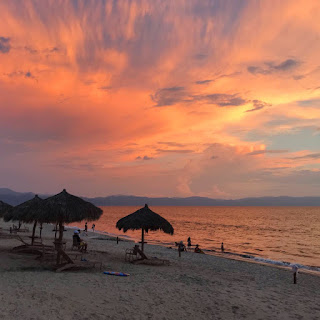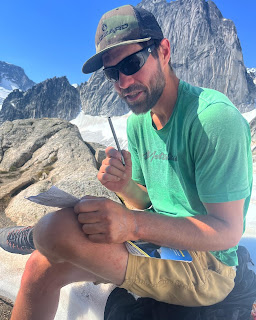Can you travel after heart surgery and while taking an anticoagulant?
 |
| Sunset in Puerto Vallarta, Mexico |
When I was young, I had a misconception of travel. I believed it was something reserved for the "rich people," since I did not personally know anyone who had widely traveled. I thought that seeing foreign countries was an experience that a person had to work a lifetime to save up for. Thinking back on this now, it seems silly.
 |
| A photo of me holding the rope for a climbing partner in British Columbia. |
Since travel is a necessity for me, I had to figure out a solution to these questions. First, it is important to note that I have to take Warfarin because there are not other anticoagulants that are approved for mechanical heart valves. This means I need consistent testing to check my International Normalization Ratio (INR).
Also, my health insurance does not cover an INR self-test kit, so I had to figure out a way to get blood draws at a medical facility when traveling. A self-test kit might make everything a little easier, but here is what I came up with for my situation.
How does my INR testing work?
Through my medical provider, I am assigned to an anticoagulant counselor. It is this professional's job to look at the trends in my INR level and determine my dose of Warfarin. It is also her job to be a resource for me and help me to get tested consistently. I love having this assistance with such an important part of my life; it makes me feel like there is really a team of people there to help me to stay healthy.
 |
| A graph of my INR results from the last year or so. |
Travel within the U.S.
As I travel around the United States, I have very little issues. My health care provider works in a network with other health care providers throughout the country. In this case, my counselor usually writes me a letter where she explains my need for an anticoagulant, my goal range, and where the test results should be sent to. I then take this letter to the hospital (usually) and get the test completed in a lab. So far, my counselor has called ahead to make sure that the phlebotomist is able to send the test results to her easily. Once the test results have been received, my counselor calls me, and we discuss the results and any possible medication changes.
Travel outside of the U.S. (less than 2 months)
In general, I get my INR tested about once a month. Before a short trip outside of the US, I will have my INR tested a week or two before I go, then again right before I leave. I do this because I want to make sure that there have not been any spikes in my INR level that would need to be addressed before leaving the country. I then make an effort to explore the foods of the country I am visiting while keeping my Vitamin K and alcohol consumption consistent. In this scenario, I do not need to get tested abroad.
 |
| A photo I took at one of the beautiful cathedrals in Spain. |
Travel outside of the U.S. (more than 2 months):
This is where things get tricky, and to be honest, I am still working on a solution. When I spent an entire summer in British Columbia, I drove the 2 hour drive back to Washington once a month to see friends and get my INR tested at a hospital within my network. This was the easiest solution in that case.
In the future, when I do not have the ability to dip back into the states, I am planning to visit local hospitals or clinics that test INR and pay for this service out of pocket. Luckily, a "pro time"test is very common and pretty cheap. I will then be able to call or email my counselor with my test results and continue to work with her to plan my does of Warfarin. I do not foresee this as being an issue in most developed countries, so this is my approach going forward.
It is also a possibility for me to buy my own self-test kit and testing strips and send my results in the same way to the anticoagulant counselor. The negative of this approach is that I will have to pay for it on my own, but since travel is not an option for me, this is an investment I am willing to make.
 |
| A photo of me in the back of a pickup truck heading into the Mexican jungle for a climbing excursion. |
How to pack for a trip while on an anticoagulant:
The last piece of insight when traveling with an essential medication is to know how to pack. Something that I do to keep my mind at ease is to make sure I have at least double the amount of medication that I will need for my planned trip. I usually take 1/2 of this medication and put it in my carry-on bag and the other 1/2 of my medication goes into my checked luggage. If I do not have a checked bag, I will often give 1/2 of my medication to whomever I am traveling with. I want to ensure that if a bag is lost or stolen, I am not stranded in a country without my much needed medicine.
The number one thing to do when planning a big trip while on a medicine that requires constant maintenance is to talk with your doctor. Explain where you will travel, what your diet will consist of, and get their feedback.
 |
| The view from above Puerto Vallarta, Mexico |
My number one piece of advice is that if you want to travel while taking anticoagulants, don't ask yourself "Can I travel?," but instead ask, "What do I need to do to travel?" If you are looking for an answer to the first question, you might get a simple "no." By changing the wording and making travel a priority, you can start a conversation with your medical team and be safe while exploring new places.

Comments
Post a Comment